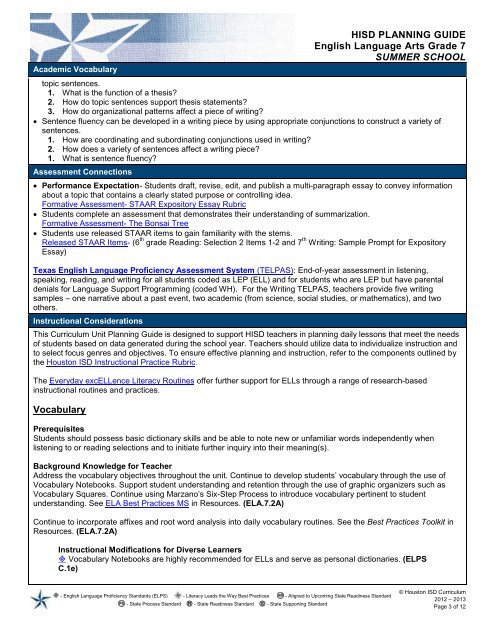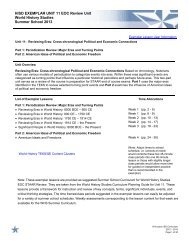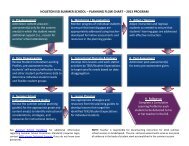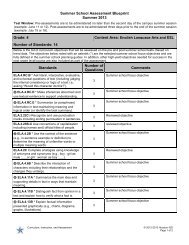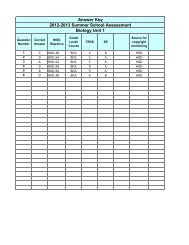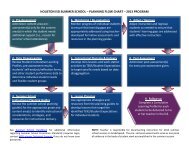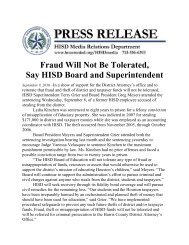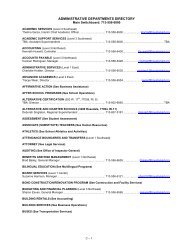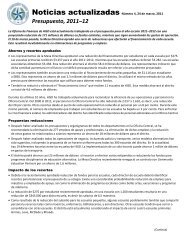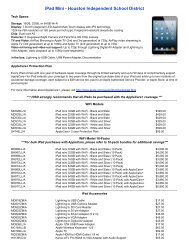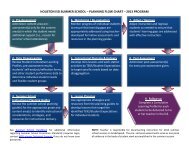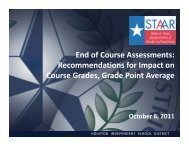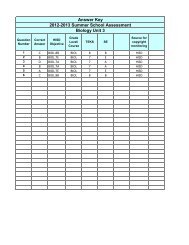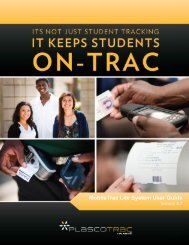SSK Unit 4.2 Planning Guide
SSK Unit 4.2 Planning Guide
SSK Unit 4.2 Planning Guide
- No tags were found...
You also want an ePaper? Increase the reach of your titles
YUMPU automatically turns print PDFs into web optimized ePapers that Google loves.
Academic VocabularyHISD PLANNING GUIDEEnglish Language Arts Grade 7SUMMER SCHOOLtopic sentences.1. What is the function of a thesis?2. How do topic sentences support thesis statements?3. How do organizational patterns affect a piece of writing?• Sentence fluency can be developed in a writing piece by using appropriate conjunctions to construct a variety ofsentences.1. How are coordinating and subordinating conjunctions used in writing?2. How does a variety of sentences affect a writing piece?1. What is sentence fluency?Assessment Connections• Performance Expectation- Students draft, revise, edit, and publish a multi-paragraph essay to convey informationabout a topic that contains a clearly stated purpose or controlling idea.Formative Assessment- STAAR Expository Essay Rubric• Students complete an assessment that demonstrates their understanding of summarization.Formative Assessment- The Bonsai Tree• Students use released STAAR items to gain familiarity with the stems.Released STAAR Items- (6 th grade Reading: Selection 2 Items 1-2 and 7 th Writing: Sample Prompt for ExpositoryEssay)Texas English Language Proficiency Assessment System (TELPAS): End-of-year assessment in listening,speaking, reading, and writing for all students coded as LEP (ELL) and for students who are LEP but have parentaldenials for Language Support Programming (coded WH). For the Writing TELPAS, teachers provide five writingsamples – one narrative about a past event, two academic (from science, social studies, or mathematics), and twoothers.Instructional ConsiderationsThis Curriculum <strong>Unit</strong> <strong>Planning</strong> <strong>Guide</strong> is designed to support HISD teachers in planning daily lessons that meet the needsof students based on data generated during the school year. Teachers should utilize data to individualize instruction andto select focus genres and objectives. To ensure effective planning and instruction, refer to the components outlined bythe Houston ISD Instructional Practice Rubric.The Everyday excELLence Literacy Routines offer further support for ELLs through a range of research-basedinstructional routines and practices.VocabularyPrerequisitesStudents should possess basic dictionary skills and be able to note new or unfamiliar words independently whenlistening to or reading selections and to initiate further inquiry into their meaning(s).Background Knowledge for TeacherAddress the vocabulary objectives throughout the unit. Continue to develop students’ vocabulary through the use ofVocabulary Notebooks. Support student understanding and retention through the use of graphic organizers such asVocabulary Squares. Continue using Marzano’s Six-Step Process to introduce vocabulary pertinent to studentunderstanding. See ELA Best Practices MS in Resources. (ELA.7.2A)Continue to incorporate affixes and root word analysis into daily vocabulary routines. See the Best Practices Toolkit inResources. (ELA.7.2A)Instructional Modifications for Diverse Learners Vocabulary Notebooks are highly recommended for ELLs and serve as personal dictionaries. (ELPSC.1e) - English Language Proficiency Standards (ELPS) - Literacy Leads the Way Best Practices - Aligned to Upcoming State Readiness Standard- State Process Standard R - State Readiness Standard S - State Supporting Standard© Houston ISD Curriculum2012 – 2013Page 3 of 12


